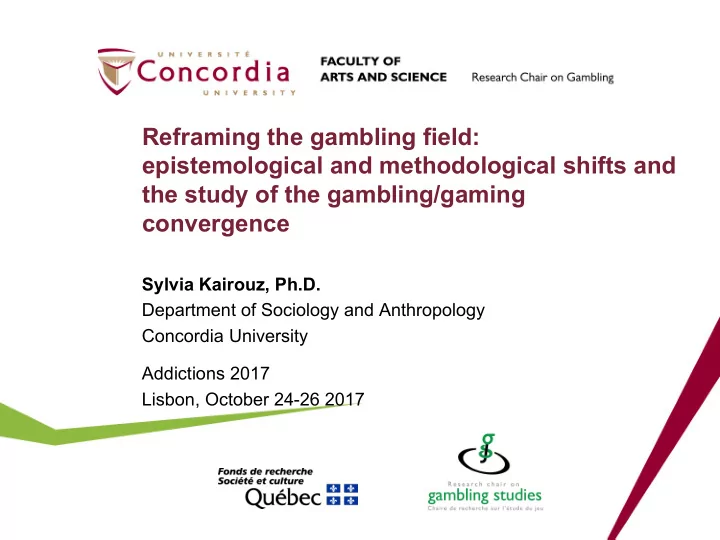

Reframing the gambling field: epistemological and methodological shifts and the study of the gambling/gaming convergence Sylvia Kairouz, Ph.D. Department of Sociology and Anthropology Concordia University Addictions 2017 Lisbon, October 24-26 2017
Disclosure § Funding sources § Fonds de recherche du Québec (FRQ-SC) § Social Sciences and Humanities Research Council (SSHRC) § No conflict of interest 2
Outline § Historical perspective: Origin and evolution of games § Divergence of the two-fields: § Theoretical perspectives § Methodological approaches § Convergences of the two-fields: § The influence of digital technologies § The zones of contentions § The unanswered questions 2
Origin of the study of games Both gaming and gambling were originally studied using similar theoretical approaches: § Social psychology / social learning theory (Bandura, 1986) § Symbolic interactionism / microsociology (Blumer, 1969) § Social context (Goffman, 1961) 3
Historical evolution (Blumer, 1969; Goffman, 1961) Symbolic GAMING interactionism Both fields Society of Micro- went in the study social different of play Social encounters directions Psychology GAMBLING (Bandura, 1986) 4
Disciplinary divide Focus on the benefits of Problem-based Qualitative consuming Quantitative analysis approach games population- based on the based lived approaches experience Context- Individually- based based analysis analysis Predominance of Predominance sociological of psychological theories theories 5
Contrasting the fields Focus on Large positive Socially No GAMING economic impacts acceptable regulations sector Exclusion of harm Market Large Focus on harm Socially GAMBLING largely economic sanctioned Exclusion of regulated sector positive experience 6
Contrasting the fields Focus on Large positive Socially No GAMING economic impacts acceptable regulations sector Exclusion of harm Gamblification Gamification Market Large Focus on harm Socially GAMBLING largely economic sanctioned Exclusion of regulated sector positive experience 6
Evolution and changes Sociality Interactivity Gambling Reward system Monetary transactions Gaming 8
Evolution and changes Hybrid Gam(bl)ing New challenges Gaming Gambling Overlapping 9
New symbolic-interactionist framework ? Interactional Multidimensional context Interpersonal level Multilevel & social life Objects of Dynamic orientation of feelings & actions 10
Complexity in contexts Emergence = process out of which new, novel, or revitalized social entities arise, that constitute change in everyday routines, practices & perspectives constitutive of new social life. Harm Pleasure Meaning in Objective realities contexts Qualitative Quantitative 11
Implication for gambling studies § Revisiting concepts pertaining to prevention in traditional gambling § Converging with basic notions in the gaming field : § The notion of play and pleasure § The importance of social context & sociality § The importance of the lived experience and the symbolic meaning of gambling § The notion of human agency 12
New challenges for the gambling field § Investigating the complexity of new digitalized forms of gambling (& hybrid games) (Gainsbury et al., 2014; King et al., 2012; Schull, 2005) : § Multilevel, multidimensional models § Dynamic models and integration of game/gamblers feedback loops. Gamblers Algorithm Machine Feedback loops Data Gambling feedback 13
New challenges for the gambling field § Investigating new digitalized forms of gambling in relation to mobility (Green, 2002; Lupton, 2015; Pastinelli, 2006) : § Connectivity, space, and games § Connectivity, time, and games § Redefining the dimensions of addictions – the importance of time § The notion of human agency 14
THANK YOU concordia.ca/fr/recherche/chairejeu
Recommend
More recommend